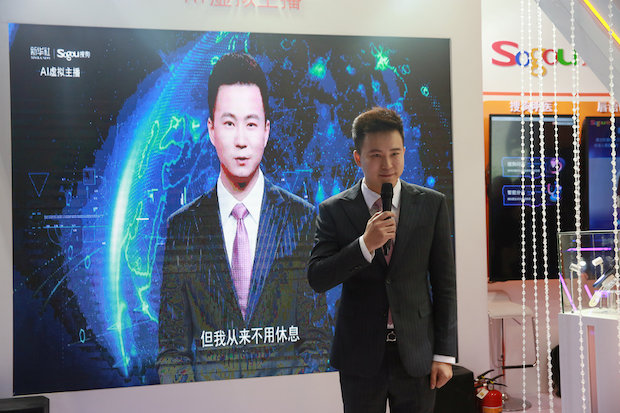
WUZHEN, China: Chinese news readers may have some new competition — artificially intelligent robot anchors that can mimic human facial expressions and mannerisms while reading out reports.
The AI anchors, developed by the state news agency Xinhua and the tech firm Sogou Inc, were on display at the World Internet Conference in the eastern Chinese town of Wuzhen, drawing in curious passers-by.
Based on the appearances of two flesh-and-blood Chinese news presenters, the computerised avatars read out text — one in Chinese, one in English — that is fed into their system, their mouths moving in tandem with the reports.
The anchors — the Chinese one is modelled on real-life newsreader Qiu Hao and sports a black suit and red tie — are part of a major push by China to advance its prowess in AI technology, from surveillance equipment to self-driving cars.
In another video presentation from Xinhua, a different robot presenter said it was his “very first day” at the news agency and promised to “work tirelessly to keep you informed as texts will be typed into my system uninterrupted”.
China's state-controlled news broadcasters have long been considered somewhat robotic in their daily recitation of pro-government propaganda, and new AI presenters will do little to dispel that view.
Sogou marketing staff said it wasn’t clear when the technology would actually go into use, but crowds gathered nonetheless to take selfies with the digital anchor and Qiu himself, who was also at the event.
The digital anchors offer certain advantages over humans, Xinhua said, such as being able to work 24 hours a day and to quickly disseminate breaking news.
The conference is China’s top tech event of the year, and has in the past attracted the likes of Apple CEO Tim Cook and Google’s Sundar Pichai.
This year’s version, however, was more muted and has a less glitzy global lineup, even as battle lines for control of the web have hardened amid a biting trade war between China and the United States.
Foreign websites such as Google and Facebook are blocked in China, where authorities also tightly control online content and censor or punish those who post material seen as opposed to “core socialist values”.